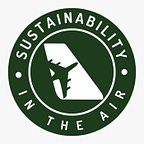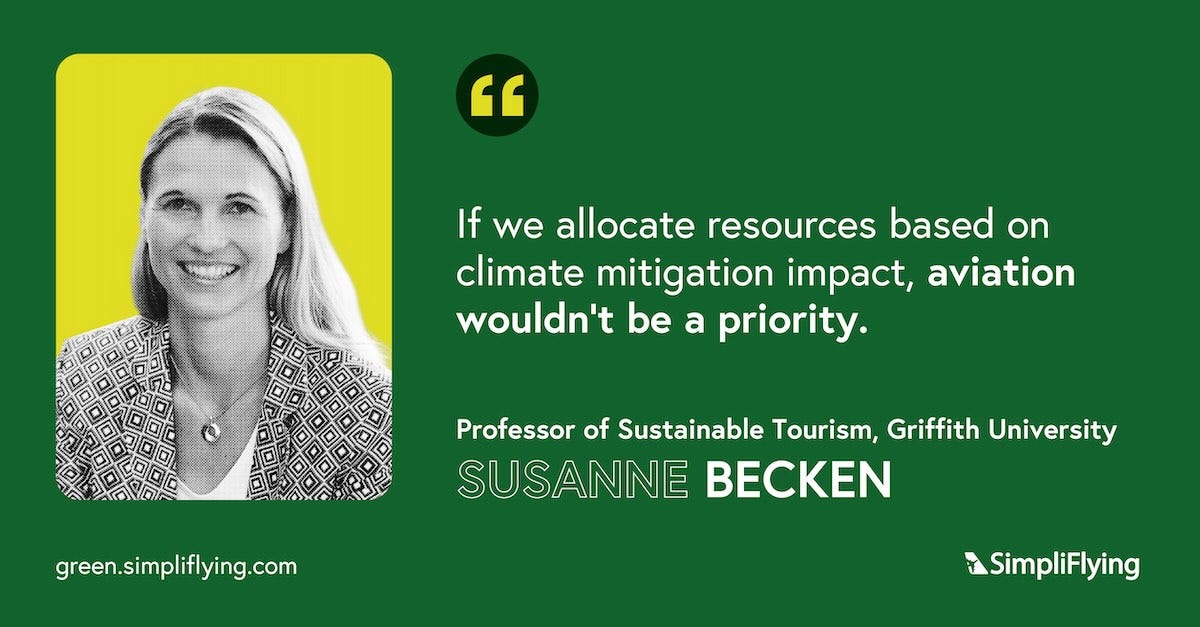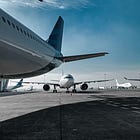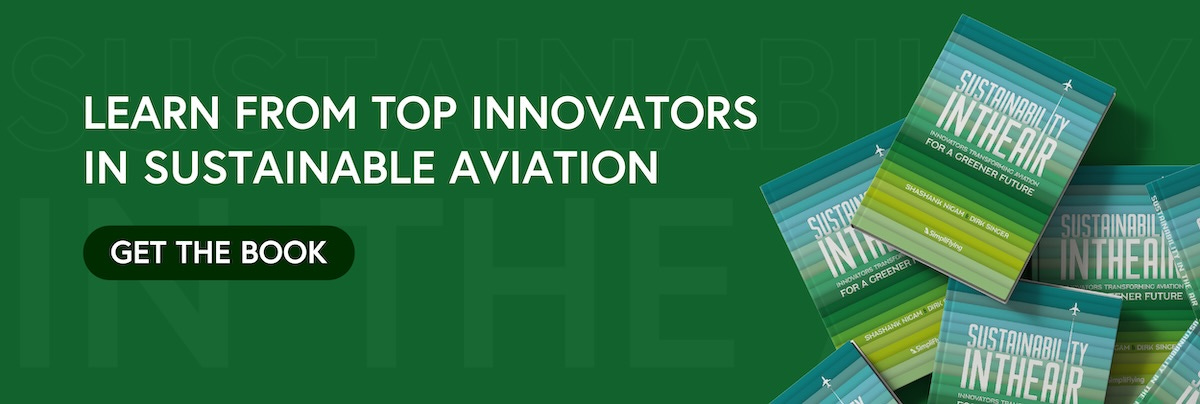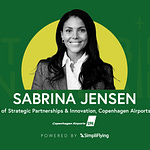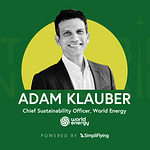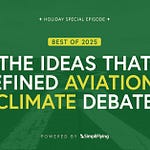In this episode of our ‘Sustainability in the Air’ podcast, Dr Susanne Becken, Professor of Sustainable Tourism at Griffith University, Australia, speaks with SimpliFlying CEO Shashank Nigam, and discusses various aspects of sustainable travel and its relationship with climate change.
With her roots in Germany, current engagement at Griffith University in Australia, and residing in New Zealand, Becken is a unique voice in sustainable tourism. Her global lifestyle has fostered a deep connection with airlines, fuelling her dedication to enhancing their sustainability. Her insights are deeply entrenched in her personal experiences, which resonate with the concerns of a global citizen.
Becken has widely published on the topics of sustainable tourism, energy use and greenhouse gas emissions, tourist behaviour, environmental policy, and risk management. She was a contributing author to the Fourth and the Fifth IPCC Assessment Reports. In the episode, she is particularly vocal about the tangible impacts of climate change, referencing the year’s unprecedented climate anomalies and highlighting the heightened susceptibility of tourism destinations to environmental catastrophes.
Here are the key highlights of the conversation:
The significant impact of climate events on tourism (3:29)
Will there be enough SAF to meet the global airline demand (7:57)
Demand management and frequent flyer taxes (17:13)
Bridging the gap between climate awareness and action (26:28)
The idea of an ecological ceiling in tourism (29:36)
Rapid Fire! (37:28)
Keep reading for a quick overview of the episode.
Why value-based tourism matters
Becken argues for a transition from quantity-focused to quality-centric approaches for tourism. She believes that value-based or regenerative tourism is vital for ensuring sustainable and culturally respectful travel experiences.
Becken cites Bhutan as a model, with its well-managed tourism sector, including sustainability fees that balance visitor influx with environmental conservation.
She also mentions Vanuatu’s efforts in ensuring that tourism serves local well-being.
However, Becken doesn’t shy away from discussing the challenges inherent in this model, such as balancing tourist numbers with ecological and cultural preservation, illustrating the delicate equilibrium that must be maintained. She also talks about the concept of the ecological ceiling to guide tourism towards a value-based model, steering it away from the prevalent “mass tourism model” that is inherently destructive for the local ecosystems.
“The concept of regenerative tourism, gaining traction particularly in the Pacific Islands, aligns with our cultural worldview of being one with nature. It’s about tourism not just taking, but also giving back, which has tremendous potential. Of course, we still need to decarbonise flights, but there’s a significant shift in thinking about what tourism can contribute to the country, rather than merely serving tourists. Many visitors are eager and willing to participate in such initiatives.”
5 ideas to rethink tourism and aviation
1. Why is decarbonising aviation such a challenge?
Becken states that aviation’s heavy reliance on fossil fuels and the lack of a clear pathway to shift to cleaner energy sources make a sustainable transition for the sector quite complex.
Becken has researched the technical and practical challenges of replacing conventional aviation fuels with sustainable alternatives. She underscores the difficulties in obtaining adequate renewable resources for aviation, such as biomass and green hydrogen, without compromising other sectors’ needs.
“We’re dealing with numerous challenging sectors. The question is, how do we manage all [of them] simultaneously and within a short time frame?”
2. Demand management in aviation net zero roadmaps
Having analysed 12 aviation decarbonisation roadmaps in her recent paper, Becken notes the absence of demand management strategies in most of them.
She observes that these net zero plans predominantly focus on sustaining or increasing the number of flights, and do not consider the necessity of reducing or stabilising these volumes. This approach, according to Becken, may undermine the genuine pursuit of sustainability in the aviation sector and necessitates a reevaluation of current strategies.
While the switch to alternative aviation fuels, which are currently 2-8 times more expensive than Jet-A, is likely to increase the overall cost and rein in the travel demand, the industry isn’t making any proactive efforts to regulate the increasing passenger volumes, she adds.
“There are very few [roadmaps], such as the International Energy Agency’s Net Zero plan, which specifically includes maintaining certain types of travel at 2019 levels. Then there’s the ICCT, the International Council on Clean Transportation, which has measures for shifting to rail, although it’s a minority view. Naturally, any new fuel will likely become costlier, which will be reflected in the price, leading to some inherent demand management. However, currently, the airline industry isn’t advocating for maintaining a steady state, nor are governments significantly implementing carbon taxes on flying.”
3. Will there be enough SAF to meet the global airline demand?
Becken addresses the uncertainty surrounding the aviation decarbonisation net zero roadmaps.
Sustainable aviation fuel (SAF) forms the basis of the industry’s decarbonisation plans. However, SAF production is very resource-intensive and costly. Becken voices concerns about the aviation sector’s ability to secure sufficient SAF volumes.
In her study, it was found that producing sufficient volumes of SAF could use up 9% of global renewable electricity, 30% of available biomass in 2050 with significant energy losses, and 30% of green hydrogen.
“In my work, I’m frequently asked about fair resource allocation, and where aviation fits in. This often depends on the criteria used. There’s a concern that the allocation follows market economics – whoever pays the most gets the resources. So, if aviation is vital to enough people who can afford it, the industry might gain access as it's seen as a luxury. However, if we allocated resources based on the greatest climate mitigation impact, it wouldn’t be aviation but the electricity sector. We’d need to focus on eliminating coal-fired power plants.”
4. How effective are frequent flyer taxes?
In her discussion on sustainable aviation economics, Becken delves into the potential implementation of a frequent flyer tax. While acknowledging the complexities in administering frequent flyer taxes, she advocates for their effectiveness in mitigating aviation emissions. Especially since it has been shown that only ~1% of frequent flyers account for about half of aviation’s emissions.
Becken also highlights a proposal in New Zealand for a departure tax to illustrate how taxes can be used to enable a greener transition for aviation. The departure tax will help create a fund to establish SAF plants in the country, allowing New Zealand to attain self-sufficiency in terms of fuel.
“The frequent flyer tax has been proposed, and from a justice perspective, it makes sense. A study shows that 1% of frequent flyers are responsible for half of the emissions, while only 4% of the world’s population fly internationally. This indicates a significant inequality in emissions distribution. However, I understand from experts that implementing such a [frequent flyer] tax would be incredibly challenging.”
5. Bridging the gap between climate awareness and action
Despite the growing awareness about climate change, there remains a significant disconnect between public proclamations of environmental concern and tangible actions.
This gap, Becken explains, underscores the necessity for stronger systems and incentives to encourage sustainable choices, such that stated environmental objectives align with actual behaviour.
For example, to promote sustainable travel, governments and regulators must make it easier and simpler for people to take trains, especially in Europe where buying train tickets is arguably more difficult than booking a flight.
“It’s a common human trait, isn’t it? We often start the year with good resolutions, say certain things, and then act differently. People [also] tend to stick more to public commitments, as research indicates. This gives weight to climate pledges, despite any cynicism; they create an obligation not easily abandoned. We also need to improve systems to facilitate easier sustainable choices.”
Dr Susanne Becken’s valuable insights on sustainable aviation have also found a mention in our new book ‘Sustainability in the Air’. The book highlights the journey of innovators navigating the industry’s challenges to make sustainable aviation a reality, and recommends positive changes that aviation can make.
‘Sustainability in the Air’ is the world’s leading podcast dedicated to sustainable aviation. Through in-depth conversations with top aviation leaders, we break through the clutter and provide a clear roadmap for a net-zero future.


